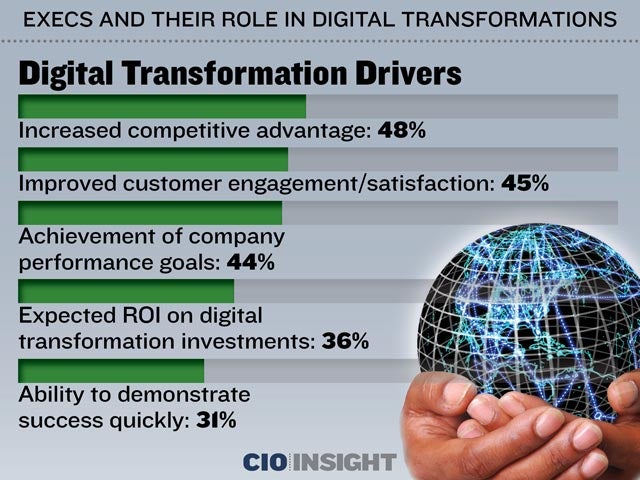
Execs and Their Role in Digital Transformations
 Execs and Their Role in Digital Transformations
Execs and Their Role in Digital Transformations
Company leaders acknowledge the significance of digital transformation, yet many aren’t taking an active role in its implementation because they lack confidence.
 Topic A
Topic A
77% of survey respondents said digital transformation has emerged as a top strategic priority for their organization.
 Digital Transformation Drivers
Digital Transformation Drivers
Increased competitive advantage: 48%, Improved customer engagement/satisfaction: 45%, Achievement of company performance goals: 44%, Expected ROI on digital transformation investments: 36%, Ability to demonstrate success quickly: 31%
 Continuing Success
Continuing Success
75% of survey respondents said their company met its digital transformation objectives last year, and 69% said it will do so this year.
 Biggest “Success Indicators” for Digital Transformation
Biggest “Success Indicators” for Digital Transformation
Increased revenue: 40%, Improved customer satisfaction: 34%, A more seamless customer experience: 33%, Greater customer engagement: 27%
 Unattended Area, Part I
Unattended Area, Part I
Only 38% of survey respondents consider internal process optimization as a digital transformation objective.
 Unattended Area, Part II
Unattended Area, Part II
Just 14% cited the improvement of employee engagement as a digital transformation objective.
 Unfinished Work
Unfinished Work
61% said their company needs to make significant changes to meet its digital transformation objectives.
 Improvement Areas
Improvement Areas
With regard to these changes, 40% said increased sponsorship and oversight on the part of senior leadership is needed, while 39% cited the establishment of an effective organizational and governance model for a digital transformation.
 Top Digital Transformation Tech Investment Areas
Top Digital Transformation Tech Investment Areas
Big data/analytics: 58%, Mobile computing: 36%, Software as a Service (SaaS): 29%, Infrastructure as a Service (IaaS): 26%, Electronic payments/settlement: 21%
 Fast Lane
Fast Lane
96% of survey respondents said the pace of change as impacted by digital transformation is accelerating, with 62% indicating it’s accelerating “significantly.”